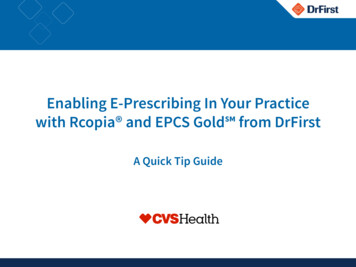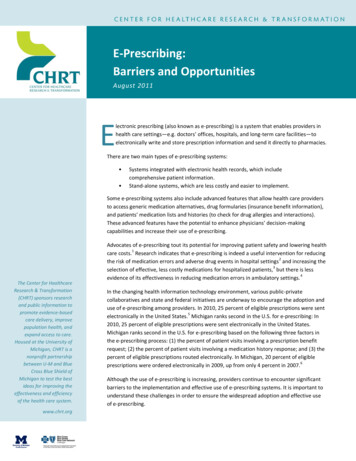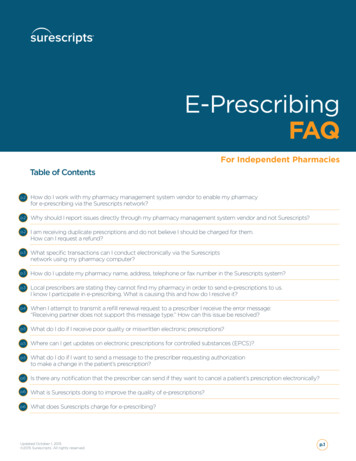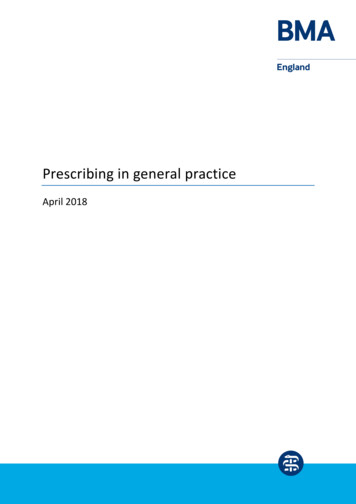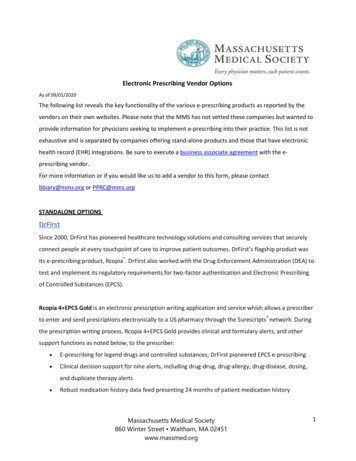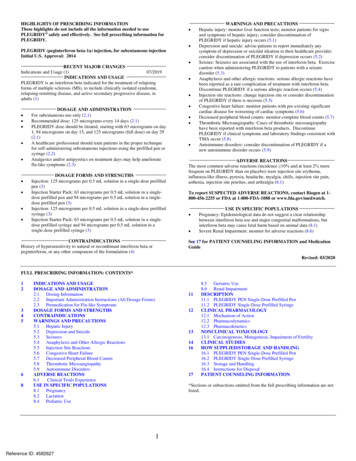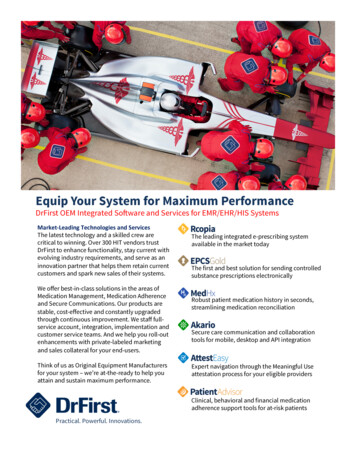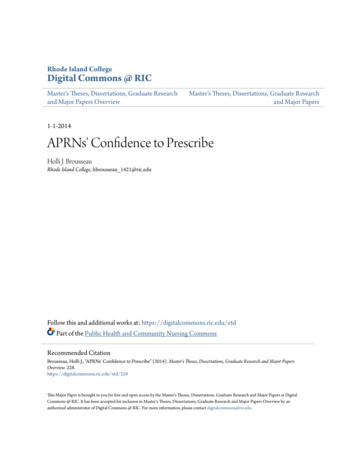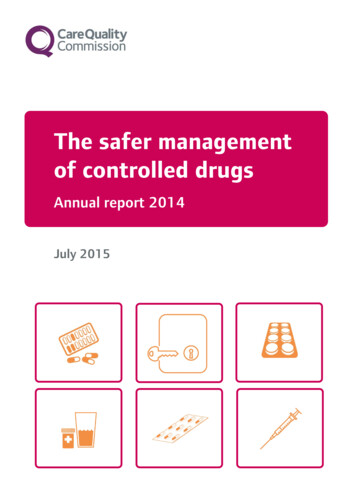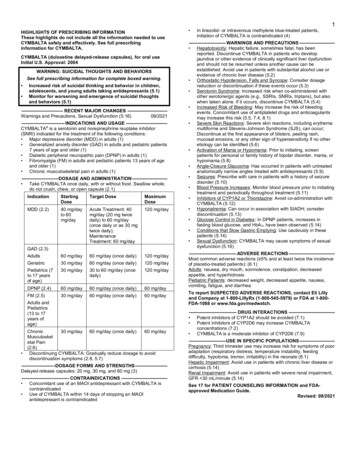
Transcription
Prescribing issues – A brief guide for dental practitionersThis guide offers advice to dental practitioners on prescribing issues, common medications with oralhealth side effects, drug interactions, the management of patients on antiplatelet and anticoagulantsand emergency drugs kits. It also signposts dental practitioners to the latest guidance from theNational Institute for Health and Care Excellence (NICE) on appropriate antimicrobial stewardship toensure the effective use of antimicrobials.Prescribing requests to GPsDentists are able to prescribe for preparations listed in the dental practitioners’ formulary. Ifmedication is required for treating/preventing a dental condition then the prescribing and monitoringshould be carried out by the dentist. There may be occasions when the *specialist dental servicesrequest the GP to continue the supply of oral health preparations, for example for a vulnerable personwho is known to be on repeat medication from their GP. In such cases the dentist should liaise withthe GP directly to gain agreement that they are happy to prescribe. They should then provide as aminimum: Name and strength of preparation to be prescribed and frequency The quantity of toothpaste that should be used and how long the tube of toothpaste shouldlast Intended duration of treatment, including the date of the next dental review Any supporting information to ensure the GP feels competent to prescribe*Community specialist dental service clinics in Sheffield are run from; Firth Park, Wheata Place,Heeley Dental Clinic, Manor Dental Clinic, Jordanthorpe Dental Clinic, Limbrick Dental Clinic, TalbotSpecial School and Norfolk Park Special School. See appendix for template letter used by theseclinics.Medications that can affect oral healthCommon adverse effects of medication on oral health and examples of groups that are associatedwith these are tabled below.Please note this list is not exhaustive; also please see individual Summary Product CharacteristicsPotential sideeffects on oralhealthMedicationPractical adviceBisphosphonaterelatedosteonecrosis of thejaw (BRONJ). NB.This primarily occurspost dental surgeryBisphosphonates.(This is very rarewhenbisphosphonatesare used inosteoporosistreatment estimated 1 in10,000 to 1 in100,000, butAll cancer patients receiving intravenousbisphosphonates should have a dental check-upbefore bisphosphonate treatment. Urgentbisphosphonate treatment should not be delayed,however, a dental check-up should be carried out assoon as possible. Prior to starting IV bisphosphonatetreatment patients should be given a reminder cardinforming them about the risk of BRONJNon cancer patients who start IV or oral1
Osteonecrosis of thejaw (ONJ)occurs morefrequently inoncologytreatment and isdose-dependent.The risk ofBRONJ may begreater forpatients s should have a dental examinationbefore starting treatment if they have poor dentalhealth, although it is good practice for all patients tohave had a recent examination so any treatment canbe carried out prior to starting the bisphosphonate.Denosumab(60mg – rare,120mg –common)It is important to evaluate patients for risk factors forONJ before starting treatment (NB. the MetabolicBone Centre ensures this is done prior tocommencing treatment). A dental examination withappropriate preventive advice is recommended priorto treatment with denosumab in patients withconcomitant risk factors.All patients should be encouraged to maintain goodoral hygiene, receive routine dental check-ups, andimmediately report any oral symptoms such as dentalmobility, pain or swelling during treatment withdenosumab.All patients should be encouraged to maintain goodoral hygiene, have routine dental check-ups, andimmediately report any oral symptoms such as dentalmobility, pain or swelling.Follow guidance in Delivering Better Oral /uploads/attachment data/file/367563/DBOHv32014OCTMainDocument 3.pdfFollow guidance in Delivering Better Oral /uploads/attachment data/file/367563/DBOHv32014OCTMainDocument 3.pdfIncreased risk ofdental cariesSugar containingliquid medicationPrescribers should consider using a sugar free (SF)preparation wherever possible if a liquid medicationis required.Follow guidance in Delivering Better Oral /uploads/attachment data/file/367563/DBOHv32014OCTMainDocument 3.pdfDry antipsychotics*and tricyclicantidepressants.Review continued need for medication in conjunctionwith GP to consider alternative options. If continuedneed required, consider self-help techniques (e.g.chewing sugar free gum, regularly sipping on water).Salvia supplementation may be prescribed if abovemeasures not successful. See dental Patients who need to continue on medication causinga dry mouth may be more prone to tooth decay,consider using fluoride preparations.*See clozapinebelowAvoid prescribing acidic preparations in dentatepatients. Examples of pH neutral prescribablepreparations are: Artificial saliva dental oral sprayDPF – oral spray BioXtra – gel and sprayFollow guidance in Delivering Better Oral /uplo2
ads/attachment data/file/367563/DBOHv32014OCTMainDocument 3.pdfDyskinesia anddystoniacharacterised byabnormalmovements of thetongue or facialmuscles sometimesassociated withabnormal eRefer to overseeing specialistGastrointestinalulceration, includingoralNicorandil (rare)All non-healing oral ulcers should be urgentlyreferred for further assessment and investigation.(extrapyramidalside effectsgreater with thefirst generationantipsychoticdrugs – See BNFfor details on sideeffect profile)As symptoms can hinder dental care andexamination, management of these symptom shouldbe discussed with the overseeing clinicianBenzydamine 0.15% mouthwash or spray may beused for symptomatic relief.Once a nicorandil related oral ulcer has beendiagnosed, consideration of dose reduction orwithdrawal of nicorandil on discussion with the GPmay be appropriate. However, this may depend on asuitable alternative medication being available.Nicorandil reduction/withdrawal should take placeonly under the supervision of the GP or cardiologist.Gingivalenlargement.Calcium channelblockers(depends on drug,in the main, veryrare)Implement preventative measures including hygienetherapy. If symptoms still persist liaise withoverseeing GP/clinician.phenytoin (rare)Oral candidiasisInhaledcorticosteroids(very common)Where appropriate, patient to use a spacer device toadminister the inhaled corticosteroid, and counsel ongood inhaler technique. Patients can be signpostedto the community pharmacist for advice on inhalertechnique. After each dose advise to rinse with water(or cleaning child’s teeth) to remove any drugparticles.Teeth grinding(bruxism)Psychotropicmedicines e.g.antidepressantsandantipsychotics(uncommon)If symptomatic and persistent, consider biteguardand physiotherapy,Emergency drugs kitDentists should base their decision on what drugs to carry in their emergency drugs list based on theirown expert opinion and on the evidence available. Many dental practices and the CPR teams that3
visit them have historically referred to the Resuscitation Council (UK) guidance. The Council has nowre-published its cardiac guidance but this update does not include an advised list of emergency drugs.The Scottish Office (the National Dental Advisory Committee of the Scottish Government) publishedthe following list in 2015, which reflects what was in the historical Resuscitation Council document,adapted locally to reflect current licensed preparations; Glyceryl trinitrate spray (400 micrograms per metered dose)Salbutamol inhaler (100 micrograms per activation)Adrenaline (1 ml ampoules or pre-filled syringes of 1:1000 solution for intramuscular injection)Note that pre-filled syringes are useful in an emergency situation for ease of use.Aspirin (300 mg dispersible tablets)Glucagon (for intramuscular injection of 1 mg)Oral glucose/sugar e.g. non-diet fizzy drinks, glucose gel, powdered glucose and sugar lumpsMidazolam buccal liquid * (Buccolam 2.5mg, 5mg, 7.5mg and 10 mg oromucosal solution islicensed in children under 18 years)Oxygen cylinder: at least 30 minutes supply at 15 litres/minute.*Midazolam/Buccolam –medication should be given if seizures are prolonged (convulsivemovements lasting 5 minutes or longer). Buccolam might be usefully administered while waiting forambulance treatment, but the decision to do this will depend on individual circumstances given thepatient’s medical history. Local community pharmacists can supply Buccolam against a writtenrequisition (an FP10CDF form should be used). Forms can be obtained from Primary Care SupportEngland, phone number – 01302566620 NB. Midazolam is a schedule 3 controlled drug but in thisform (Buccolam ) it does not require storage in safe custody.The full Scottish guidance is available ads#res469019Each practice must make a decision as to what it carries. Dental practices should have StandardOperating Procedures (SOP) in place to manage the safe use and disposal of EmergencyMedications. SOPs should include: Ordering Storage - All emergency drug kits should be stored in a locked drugs cabinet or cupboardwhen clinics are closed. Stock and date checking Disposal Training and competencyManaging a dental patient taking an anticoagulant or antiplatelet drug(s)Advise patients on anticoagulants or antiplatelets to inform dental practitioners of treatment at eachdental appointment.The Scottish Dental Clinical Effectiveness Programme (SDCEP) has produced guidance on themanagement of dental patients taking anticoagulants or antiplatelet drugs.See link for quick reference guide - /SDCEPAnticoagulants-Quick-Reference-Guide.pdfSee link for full guidance – /SDCEPAnticoagulants-Guidance.pdfThis guidance aims to provide clear and practical advice to enable the dental team to manage andtreat this patient group. Please note, this reference does not include edoxaban which is a once a day4
DOAC (also known as NOAC). Dosing schedule advice for dental procedures for rivaroxaban shouldbe followed for patients taking edoxaban, based on local expert opinion. Any bleeding complications following this advice should be reported through normalmechanisms (e.g. yellow card, overseeing clinician)Low Molecular Weight Heparins (Dalteparin, Enoxaparin, Tinzaparin) - for procedureslikely to cause bleedingManagement depends on whether the patient is on a prophylactic or treatment dose.Prophylactic doses for dalteparin (the LMWH currently used in Sheffield)Dalteparin prophylactic dosesWeight 45kg or eGFR 20ml/min/1.73m22500 units ODWeight 45-99kg5000 units ODWeight 100-150kg7500 units ODWeight 150kg5000 units BD Ensure LMWH is injected in the evening (if taking it at a different time of day, doses may bemoved forward by up to 4 hours each day, liaise with overseeing prescriber). Arrange dental appointment to be in the morning. If no problems/bleeding following dental work, restart LMWH in the evening at least 4 hours postprocedure.Treatment doses (i.e. any dose greater than a prophylactic dose) If injecting LMWH once daily, take it in the morning (if taking it at a different time of day, dosesmay be moved forward by up to 4 hours each day). If injecting LMWH twice daily, continue at usual times. Arrange dental appointment to be in the morning. Omit LMWH on the morning of dental work. If no problems/bleeding following dental work, restart LMWH in the late afternoon/evening at least4 hours post-procedure.Note – If timing of injection is changing check who is administering the dalteparin, and liaise with thecommunity nursing teams if necessary.Common drug interactionsPlease note this list is not exhaustive; also please see individual SPC and BNFMedicationCommon interactions toconsider (refer to BNF andindividual SPCs for full list)Suggested actionMetronidazoleWarfarinAvoid concomitant prescribing.If concurrent use cannot beavoided, contact theanticoagulant service providerto organise a reduction in the5
warfarin dose and monitorappropriately.Cytotoxics (busulfan andfluorouracil)Penicillins (e.g. amoxicillin)Warfarin – INR can be altered.Combined oral contraceptivesAntifungals: Fluconazole.Antifungal: Miconazole (oralgel).Increases anticoagulant effectof warfarin.Discuss with overseeingoncologistLiaise with the overseeing GP/clinician as it is recommendedthat the INR is checked 3–7days after starting the newmedication and the GP/clinicianwill adjust warfarin doseaccordingly.No extra precautions requiredunless diarrhoea and vomitingoccurs. Instruct the patient toseek advice from their GP if thisoccurs. (see BNF)Numerous other interactions,prescribers should refer tocurrent BNF for full list.Increase in anticoagulant effectis greater with larger doses andin the elderly. Liaise with theGP/clinican to ensure INR ismonitored appropriately andwarfarin dose adjustedaccordingly. Advise patients toreport any unexplained bruisingor bleeding.Increases anticoagulant effectof warfarin.Avoid - potentially seriousinteraction. Use nystatin insteadNumerous other interactions,prescribers should refer tocurrent BNF for full listNSAIDs (e.g. aspirin,diclofenac, ibuprofen)Numerous interactions,prescribers should refer tocurrent BNF for full listMacrolides (e.g. erythromycin,clarithromycin, azithromycin)Numerous interactions,prescribers should refer tocurrent BNF for full listCephalosporins (e.g. cefalexin)Certain cephalosporins canenhance the effect of warfarin6Be aware of the potentialincreased bleeding time postextraction. Local measuresmay suffice with good postoperative instructions. Do notdischarge patients until goodhaemostasis post-surgery. Ifnecessary consider a localhaemostatic agent or suturing.Cefalexin and cefradine arethought to be the safercephalosporins. If acephalosporin is required,increased awareness required.Please note there is anincreased risk of opportunisticinfections (e.g. C.difficile). TheSheffield Formulary has nospecific indications forcephalosporins.
TetracyclinePossible enhancedanticoagulant effect of warfarinPossible increase risk of benignintracranial hypertension withretinoidsLiaise with GP /overseeingclinician to monitor INRappropriately.Avoid concomitant useAntibiotic StewardshipResistance to antimicrobials in increasing. In August 2015 NICE published good practicerecommendations for the effective use of antimicrobials. Antibiotics should only be prescribed whenthis is clinically appropriate. Recommendations from the guidance include: When prescribing antimicrobials, prescribers should follow local or national guidelines on:o prescribing the shortest effective courseo the most appropriate doseo route of administration. When deciding whether or not to prescribe an antimicrobial, take into account the risk ofantimicrobial resistance for individual patients and the population as a whole. When prescribing any antimicrobial, undertake a clinical assessment and document theclinical diagnosis (including symptoms) in the patient's record and clinical management plan. For patients in primary care who have recurrent or persistent infections, consider takingmicrobiological samples when prescribing an antimicrobial and review the prescription whenthe results are available. For patients who have non-severe infections, consider taking microbiological samples beforemaking a decision about prescribing an antimicrobial, providing it is safe to withhold treatmentuntil the results are available.The full guidance and recommendations are available 69Further guidance on prescribing is available from the Faculty of General Dental act.ashxAntibiotic GuardianAntibiotic resistance is one of the biggest threats facing us today. Without effective antibiotics manyroutine treatments will become increasingly dangerous. To slow resistance we need to cut the use ofunnecessary antibiotics. Dentists are encouraged to make a pledge and become an antibioticguardian to show commitment to support this health risk. Pledges can be made here http://antibioticguardian.com/7
ReferencesPublic Health England - Delivering better oral health: an evidence-based toolkit for -toolkitfor-prevention#historyElectronic Medicines Compendium – SPC for alendronic acid tronic Medicines Compendium – SPC for Prolia ical Knowledge Summaries - Candida – oral - ctronic Drug Tariff - http://www.ppa.org.uk/edt/March 2015/mindex.htmMHRA Drug Safety Update - isk-of-gastrointestinalulcerationAntibiotic prescribing in General Dental Practice – Primary Dental Journal; Feb 14, vol 3, no 1UKMi Q and A - Saliva substitutes: Choosing and prescribing the right product https://view.officeapps.live.com/op/view.aspx?src 2FNWQA190.6Salivasubstitutes.docNICE PH55 – Oral health: local authorities and Partners - https://www.nice.org.uk/guidance/ph55Oral healthcare in prisons and secure settings in England - rch/patient-care/Documents/oral health in prisons eng.pdfMHRA Bisphosphonates: use and safety etyThe management of dental patients taking anticoagulants or antiplatelet drugs gs-new-guidance-from-sdcep/Produced by; Claire Stanley (Medicines Management Pharmacist, Sheffield CCG), Heidi Taylor(Clinical Effectiveness Pharmacist, Sheffield CCG), John Heyes (Clinical Advisor (Dental), NHSE),Kate Jones (Consultant in Dental Public Health, Public Health England) and Jo Adlington (Specialistin Special Care Dentistry, STHFT).With thanks to colleagues at STHFTApproved by APG: January 2016Review date; January 20198
Appendix 1Our Ref:Date:FAO: Dr.Dear Dr.Re:This patient attends our service for dental care and would benefit from the continuous use of ‘prescription only’high fluoride toothpaste as a result of:A high risk of developing dental decay due to: The nature of their disability A dry mouth (xerostomia)A moderate risk of decay but there are significant problems/risks associated with managing dental decay for thispatient due to: The nature of their disability Dental phobiaI am writing to request that you provide the following on a regular basis:Duraphat 2800ppm toothpaste 75ml(0.619% sodium fluoride)Required every 6 weeksDuraphat 5000 ppm toothpaste 51g(1.1% sodium fluoride)Required every 4 weeksDirections:Brush pea-size amount onto teeth and gums twice a day. Spit out. Do not rinse.Warnings:Store safely. Do not exceed recommended dose. When used as recommended there are no known side effects.Review:This patient is having regular review with us and we will contact you again by if themedication is to be continued.To support oral health in patients with genuine health vulnerabilities Sheffield LMC feels it reasonable for a GP tocontinue to prescribe fluoride toothpaste as long as all the above information is provided.If you cannot issue the prescription or have any questions about the oral management of this patient please donot hesitate in contacting me at the above address.Thank you for your help in this matter.Yours sincerely,9
1 Prescribing issues - A brief guide for dental practitioners This guide offers advice to dental practitioners on prescribing issues, common medications with oral health side effects, drug interactions, the management of patients on antiplatelet and anticoagulants
